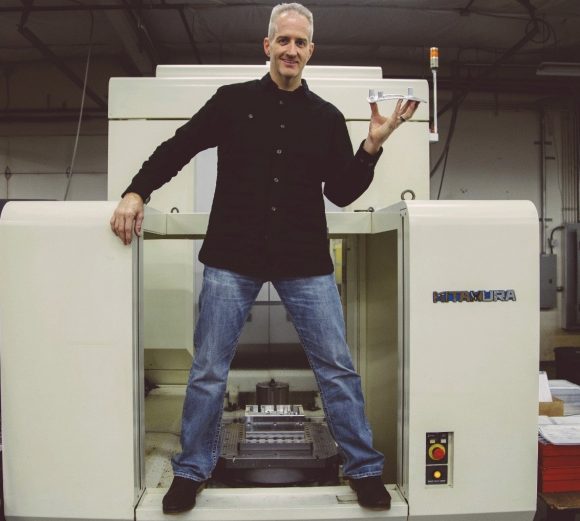Note: The Swarfcast team is enjoying a short summer break this weekend. We’ll be back next week with a fresh blog. In the meantime, enjoy this great episode from 2020 on incorporating Kaizen principals into your daily life, with guest Darrell Sutherland.
Today’s guest on the podcast is Darrell Sutherland, founder and owner of Dylan Aerospace in Auburn, Washington, a Tier 1 supplier for Boeing.
Scroll down to listen to the podcast. Or listen on your phone on Apple Podcasts and Google Podcasts.
Darrell is also a professional mentor. He believes in using the Kaizen manufacturing principles for personal development as well as to improve a business. He believes in the power of mentorship so fervently that he spends over $100,000 a year on his own education.
Main Points
(3:40) Darrell talks about his personal transformation in the last decade or so. He says that for many years it was hard for him to just get out of bed because he wasn’t happy with his life, despite his success and running a business he loved.
(4:15) Darrell says growing up he looked awkward and was bullied a lot but thinks his difficult childhood prepared him for adversity later in life. He says when he was young he got into martial arts, which made him realize his passion for learning and more importantly teaching. He says he has a talent for deconstructing ideas and concepts and synthesizing them into individuals’ unique abilities.
(5:40) Darrell grew up in Washington state. His grandfather and father worked for Boeing. His father told him to never be a “number” working for Boeing.
(8:00) Darrell says his manufacturing business had been very successful and made a lot of money for a long time before he underwent his personal transformation. He was even able to take more than 10 years off from day to day operations so he would have a lot of time to raise his kids. Yet he still wasn’t content with his life as he was addicted to food and alcohol, gaining over 100 pounds. He says November of 2009 he realized that he needed to change direction, starting with his health. Darrell says it took him many years and thousands of dollars to get the guidance he needed to fix his life.
 (11:00) Darrell in the end realized that the Kaizen principles he had embraced in his manufacturing business could be applied to his own personal life. Darrell summarizes the Kaizen principles as deciding what one wants to accomplish and then analyzing and breaking it down to its root. Then a person starts making small incremental changes at the lowest level he can, and then analyzes the result at that low level. The process makes a person more aware of certain facts about his own life that he hadn’t looked at before. Then when a person can understand the roots of what the real issues are, he can understand the challenges he needs to overcome. Darrell calls his philosophy “living Kaizen,” and in his new book he writes about its parallels with the Toyota Kaizen model.
(11:00) Darrell in the end realized that the Kaizen principles he had embraced in his manufacturing business could be applied to his own personal life. Darrell summarizes the Kaizen principles as deciding what one wants to accomplish and then analyzing and breaking it down to its root. Then a person starts making small incremental changes at the lowest level he can, and then analyzes the result at that low level. The process makes a person more aware of certain facts about his own life that he hadn’t looked at before. Then when a person can understand the roots of what the real issues are, he can understand the challenges he needs to overcome. Darrell calls his philosophy “living Kaizen,” and in his new book he writes about its parallels with the Toyota Kaizen model.
(14:30) Darrell says that reshoring of manufacturing is happening quickly and we as a country need to be prepared for it. He says despite Covid-19 this is probably one of the greatest times to be in manufacturing. He says that the pandemic demonstrated to everyone that the offshoring of U.S. manufacturing during the last few decades put the United States in a terrible position in the areas of infrastructure and national security.
(15:40) Darrell says before Covid-19 he was already planning for 2020 to be a big year for his company. He says that several years ago his company started an initiative called I Love MFG. MFG stands for “Moving, Feeding, and Guarding” America and the world.
(16:55) Darrell says that young people have no connection to manufacturing. He says they don’t think about their consumer items or modes transportation that are created through manufacturing. He says with reshoring upon us he is going to devote himself to opening young people’s minds to manufacturing.
(19:30) Darrell says that people often “stumble” into the world of manufacturing rather than set out to make it their trade. He says the question we need to ask is, how do we turn people into professional manufacturing people? He says we need to analyze how people are hardwired from birth and softwired by their community and then find the lane for them in the manufacturing space. He says he interviews his employees of all levels to help them figure out their talents and find the best way they can excel at his company.
(24:30) Darrell talks about how to find mentors and why they are so important. He says mentors are important to help us to find our weaknesses so we can fix them but to find the right mentor a person has to figure out what he wants. Darrell says to look on social media for mastermind groups to locate mentors, but he warns to watch out for life coaches who haven’t already achieved anything in their lives.
Darrell says for more information about Living Kaizen people can go to his Website, darrellasutherland.com and lifeapprentaceship.com where he will be giving away a free PDF with an introduction to his program.
Question: Which self-help books have benefited you in the past?
Podcast: Play in new window | Download


